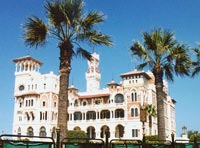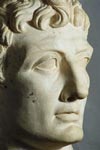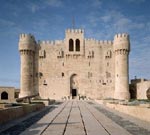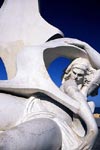|
Alexandria
Alexandria
is not only the largest port and second city of Egypt but also
the greatest summer resort in the Middle East. It is located in
the Mediterranean Sea north west of Delta, 225 km from Cairo by
agricultural road and 221 km by desert road.
 It is internationally known as “the Bride of the Mediterranean”
with beaches extending along the Mediterranean for some 30 km. It is internationally known as “the Bride of the Mediterranean”
with beaches extending along the Mediterranean for some 30 km.
Named after Alexander the Great it was built at his orders on
the site of a small old fishing village called Rhakotis, in 322
BC to be the capital of his reign in Egypt, a port near to his
country and a Greek cultural center.
Since its foundation Alexandria remained for many centuries a
center of cultural radiation in the whole world . It occupied a
remarkable place in the history of mankind. Therefore most of
the touristic places in Alexandria date to the Ptolemaic and the
Greco Roman era like the Catacombes of Kom Al Shuqqafa, the
Pompey’s Pillar , the Greco Roman Museum and the Roman
Amphitheater.
 The
Arabs occupied Alexandria and al-Fustat which later became
Cairo, the capital of Egypt. Nevertheless, Alexandria continued
to flourish as a trading center, principally for textiles and
luxury goods, as Arab influence expanded westward through North
Africa and then into Europe. The city also was important as a
naval base, especially under the Fatimids and the Mamluks, but
already it was contracting in size in line with its new, more
modest status. The
Arabs occupied Alexandria and al-Fustat which later became
Cairo, the capital of Egypt. Nevertheless, Alexandria continued
to flourish as a trading center, principally for textiles and
luxury goods, as Arab influence expanded westward through North
Africa and then into Europe. The city also was important as a
naval base, especially under the Fatimids and the Mamluks, but
already it was contracting in size in line with its new, more
modest status.
Alexandria survived the early Crusades relatively unscathed, and
the city came into its own again with the development of the
East-West spice trade, which Egypt monopolized. The loss of this
trade--which came about after the discovery of the sea route to
India in 1498 and the Turkish conquest of Egypt in 1517--was the
final blow to the city's fortunes. During the Ottoman Empire
Alexandria was a free port open to all men and ideas. Under
Turkish rule the canal linking Alexandria to the Rosetta branch
of the Nile was allowed to silt up, strangling the city's
commercial lifeline. Alexandria had been reduced to a small
fishing village when Napoleon invaded Egypt in 1798.
 After
the 1952 coup in Egypt, most of Alexandria's foreign population
left but the city still remains a thriving commercial community
and an important industrial center After
the 1952 coup in Egypt, most of Alexandria's foreign population
left but the city still remains a thriving commercial community
and an important industrial center
Alexandria was famed for its lighthouse, one of the six vanished
wonders of the world. Legend speaks of how a mysterious mirror
could reflect the light tens of kilometers away. Legend says the
mirror was also used to detect and burn enemy ships before they
could reach the shore.
 One of the greatest cultural and scientific centers specialized
in the affairs, civilization, literature, sciences and arts is
the Library of Alexandria which attracts scholars from all over
the world. One of the greatest cultural and scientific centers specialized
in the affairs, civilization, literature, sciences and arts is
the Library of Alexandria which attracts scholars from all over
the world.
Today
Alexandria is considered the second capital of Egypt. It is
distinguished by its strategic location, moderate climate and
its beautifully fine sandy beaches which covers a large area
between Agamy in the west and Abu Qeir in the east, which made
it worthy of its well merited title “Pearl of the Mediterranean”
|